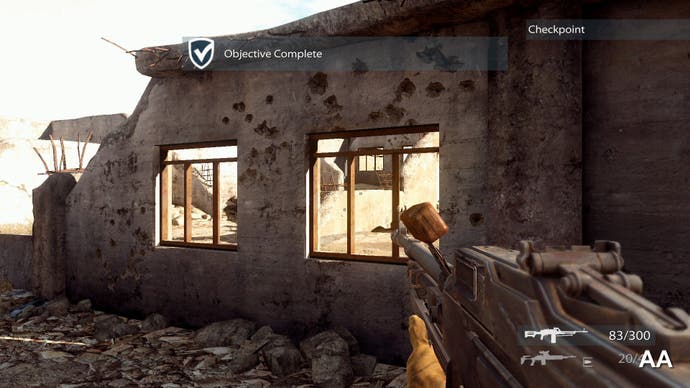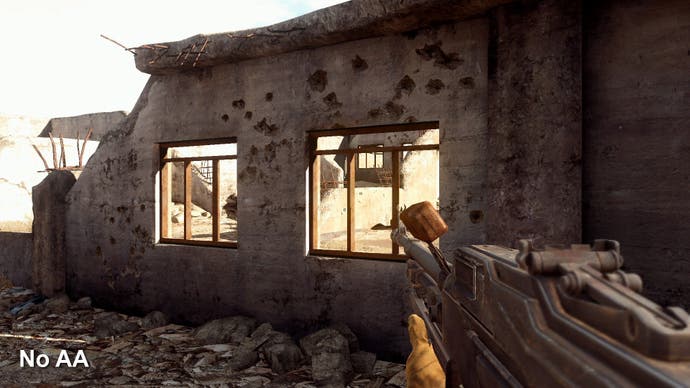Face-Off: Medal of Honor
Tiers before bedtime.
In terms of the basic visual comparisons, however, there's not much to tell the PC version apart from its PS3 and 360 siblings. There are the usual examples of better shadow filtering, highe- precision shaders and superior-quality reflections. There's a somewhat bizarre, limited anti-aliasing switch (on/off!) but it doesn't exactly do much and you'll be requiring intervention at the driver level in an attempt to improve upon this. The real advantages of the PC version are all about bumping up the resolution, playing with a much higher frame-rate, and enjoying the improved control options.
Here's the 360 version up against the PC rendition, and of course a PS3 mirror of this vid is also available. Remember that using the full-screen button offers full 720p resolution.
The video is slowed down to 50 per cent speed, which serves to emphasise how the PC version - locked at 60FPS throughout on our test system - remains smooth and fluid whereas the performance-compromised console games judder and tear. Getting that level of throughput at maximum settings does require a decent setup though - a quad-core CPU combined with something along the lines of a Radeon HD 5830 or GTX 460 should give you that quality locked-60FPS experience at virtually any resolution up to 1080p, while a GPU along the lines of the venerable 8800GT/9800GT should keep you comfortably above 30FPS.
There is an overriding sense when playing Medal of Honor on PC that EA saw the strengths of Modern Warfare but felt that the missing link was realism - the "USP" of its contribution to the genre appears to be a real conflict, with a very real enemy, and somewhat less of the Hollywood-style approach to the combat scenarios seen in MW2. However, in terms of the actual gameplay, the echoes of Infinity Ward's work are unmistakable and in the PC version the sense that you're playing a more measured and mature COD campaign is actually quite eerie.
Perhaps the general sense of dissatisfaction with the single-player campaign on console is that this is essentially a COD-style game running at half the frame-rate with next to none of the major advantages that 30FPS rendering should give, over and above full 720p resolution and generally prettier visuals; in Bad Company 2, DICE made that extra rendering time count with features that directly improve the gameplay experience, making it distinct and unique. However, at least with the PC version, you can power your way back to COD levels of performance and the transformation in the quality of the game can be quite remarkable. Not only that, but obviously the Frostbite-powered multiplayer is significantly improved with the option of higher frame-rates too - improved controller response is all-important in a first-person shooter.


In the final analysis, it seems that the only real winner here is Call of Duty: Black Ops. With Treyarch's epic-looking title just weeks away, and MOH not reviewing as well as EA might have hoped, it's not too much of a stretch to imagine that much of the target audience will be keeping their wallets sealed in preparation. Medal of Honor offers up an entertaining, albeit short-lived campaign and an accomplished multiplayer game - but there is little sense whatsoever that the game actually adds anything new to the genre. Indeed, it feels like a clone of each of its major competitors.
The PC version is undoubtedly the one to have if you a fairly decent gaming system to hand, as the ability to run the game to a higher performance level undoubtedly adds to the enjoyment factor. Console-wise, the Xbox 360 version of Medal of Honor edges it over its PS3 sibling - visually they're effectively identical, and while both games can occasionally disappoint from a performance perspective, it's the PS3 version that is prone to more dropped frames and more noticeable screen-tear whether you're playing the single-player campaign or DICE's multiplayer mode.


